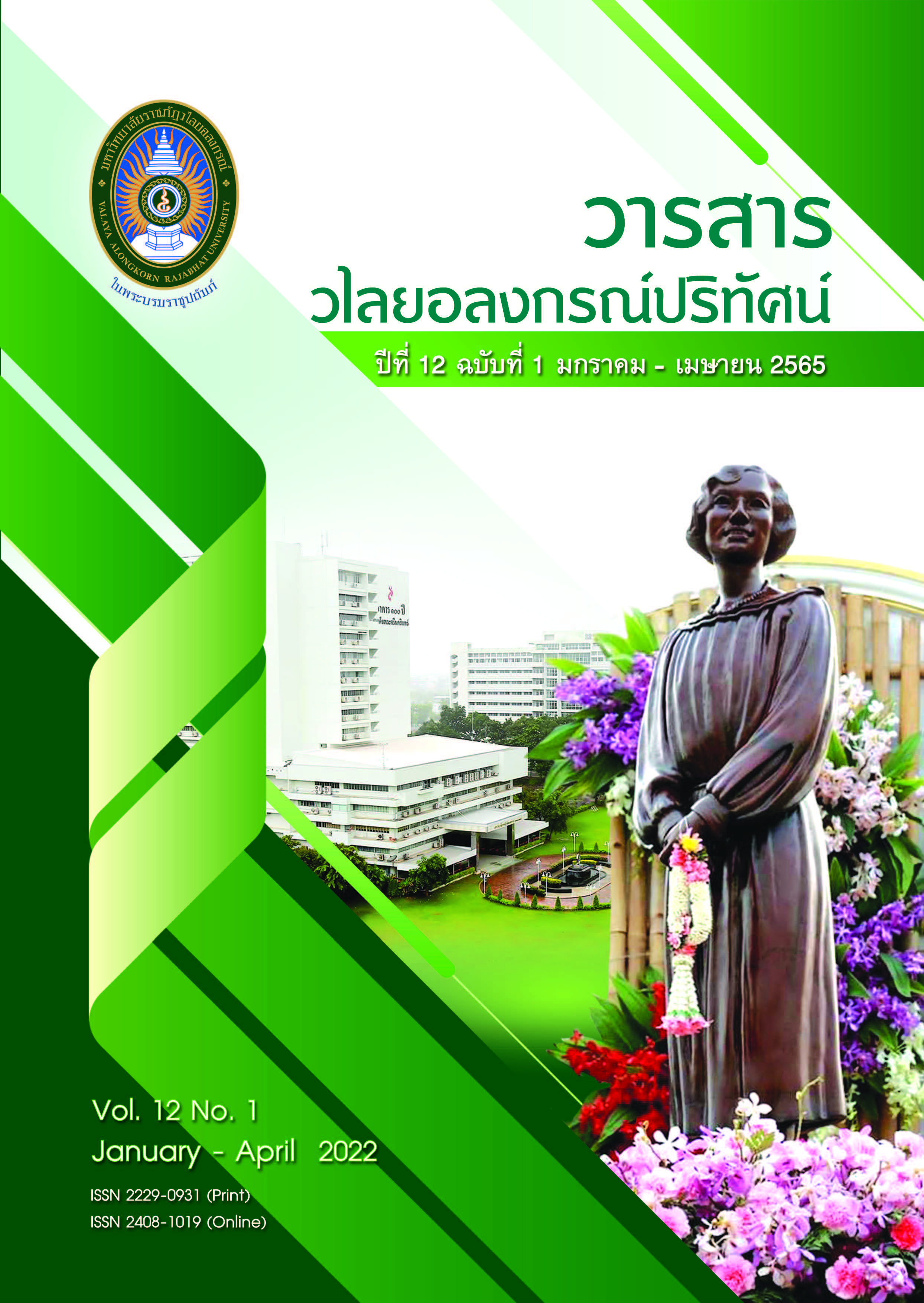ผลการออกแบบการเรียนรู้ฐานสมรรถนะ ที่มีต่อความสามารถในการสอนของนักศึกษาครู
คำสำคัญ:
การออกแบบฐานสมรรถนะ, ความสามารถในการสอน, นักศึกษาครูบทคัดย่อ
การวิจัยครั้งนี้มีวัตถุประสงค์เพื่อ 1) ศึกษาและสังเคราะห์องค์ประกอบในการออกแบบ การเรียนรู้ฐานสมรรถนะที่มีต่อความสามารถในการสอนของนักศึกษาครู และ 2) เพื่อศึกษาความสามารถในการสอนของนักศึกษาครู หลังการจัดการเรียนรู้ตามการออกแบบการเรียนรู้ ฐานสมรรถนะ กลุ่มตัวอย่าง เป็นนักศึกษาระดับปริญญาตรี ปีที่ 2 สาขาวิชาเคมีและวิทยาศาสตร์ทั่วไป คณะครุศาสตร์ มหาวิทยาลัยราชภัฏวไลยอลงกรณ์ ในพระบรมราชูปถัมภ์ ในภาคการศึกษาที่ 1 ปีการศึกษา 2563 จำนวน 1 ห้อง จำนวน 23 คน ได้มาโดยการสุ่มแบบกลุ่ม เครื่องมือที่ใช้ในการวิจัยครั้งนี้เป็นแผนการจัดการเรียนรู้ฐานสมรรถนะ แบบประเมินความสามารถในการสอนของนักศึกษาครูเป็นมาตราส่วนประมาณค่า มีค่าความเชื่อมั่น เท่ากับ 0.92 สถิติที่ใช้ในการวิเคราะห์ข้อมูล ได้แก่ ค่าเฉลี่ยเลขคณิต ส่วนเบี่ยงเบนมาตรฐาน
ผลการวิจัย พบว่า
1. องค์ประกอบในการออกแบบการเรียนรู้ฐานสมรรถนะที่มีต่อความสามารถในการสอนของนักศึกษาครู ประกอบด้วย 5 องค์ประกอบ ได้แก่ 1) กำหนดสมรรถนะที่จะพัฒนา 2) เสริมสร้างความรู้ ทักษะ และคุณลักษณะ/เจตคติ ที่สำคัญ 3) ออกแบบกระบวนการเรียนรู้แบบมีส่วนร่วม 4) ส่งเสริมสื่อและแหล่งเรียนรู้ และ 5) ประเมินแบบสะท้อนคิด
2. ความสามารถในการสอนของนักศึกษาครู หลังการจัดการเรียนรู้ตามการออกแบบ การเรียนรู้ฐานสมรรถนะ อยู่ในระดับมากที่สุด ( = 4.69, S.D. = 0.51)
เอกสารอ้างอิง
กระทรวงศึกษาธิการ. (2552). พระราชบัญญัติการศึกษาแห่งชาติ พ.ศ. 2542 (แก้ไขเพิ่มเติม พ.ศ. 2545). กรุงเทพฯ: คุรุสภาลาดพร้าว.
ชูศรี วงศ์รัตนะ. (2550). เทคนิคการใช้สถิติเพื่อการวิจัย. (พิมพ์ครั้งที่ 10). นนทบุรี: ไทยเนรมิตกิจอินเตอร์ โปรเกรสซิฟ.
บุญชม ศรีสะอาด. (2554). การวิจัยเบื้องต้น. (พิมพ์ครั้งที่ 9). กรุงเทพฯ: สุวีริยาสาส์น.
บัญชา นวนสาย และอาลัย จันทร์พาณิชย์. (2559). สมรรถนะด้านการจัดการเรียนรู้และการรู้วิชาเฉพาะด้านของ นักศึกษาครูสาขาวิชาสังคมศึกษา คณะครุศาสตร์ มหาวิทยาลัยราชภัฏบุรีรัมย์. คณะครุศาสตร์ มหาวิทยาลัยราชภัฏบุรีรัมย์.
สุวรรณา จุ้ยทอง. (2564). การศึกษาองค์ประกอบในการจัดการเรียนรู้ สำหรับนักศึกษาวิชาชีพครู ระดับปริญญาตรีให้มีเทคนิคการจัดกิจกรรมการเรียนรู้. วารสารบัณฑิตวิทยาลัยศึกษา มหาวิทยาลัยราชภัฏวไลยอลงกรณ์ ในพระบรมราชูปถัมภ์. 15(1): 191-203.
แสงดาว ถิ่นหารวงษ์. (2558). การเรียนรู้แบบมีส่วนร่วม: จากทฤษฎีสู่การปฏิบัติในรายวิชาวรรณคดีสำหรับเด็ก. วารสารมนุษยสังคมปริทัศน์. 17(1): 1-11.
สำนักงานเลขาธิการสภาการศึกษา. (2563). การจัดการเรียนรู้ฐานสมรรถนะเชิงรุก. นนทบุรี: 21 เซ็นจูรี่.
Fitz-Gibbon, F. (1987). How to design a program evaluation. Newbury Park: Sagh.
Dewey, J. (1998). Experience and Education. New York: Macmillan Publishing Company.
Shen, J., et.al. (2004). Participatory learning approach: An overview. [Online], Available: https://citeseerx.ist.psu.edu/viewdoc. (2563, 15 มกราคม).
Thomas, S. (2019). What is Participatory Learning and Action (PLA): An introduction. [Online], Available: http://idp-key-resources. (2563, 20 มกราคม).
ดาวน์โหลด
เผยแพร่แล้ว
รูปแบบการอ้างอิง
ฉบับ
ประเภทบทความ
สัญญาอนุญาต
ลิขสิทธิ์ (c) 2022 สุวรรณา จุ้ยทอง

อนุญาตภายใต้เงื่อนไข Creative Commons Attribution-NonCommercial-NoDerivatives 4.0 International License.
ข้อความที่ปรากฏในบทความแต่ละเรื่องในวารสารวไลยอลงกรณ์ปริทัศน์ เป็นความคิดเห็นของผู้นิพนธ์แต่ละท่าน มิใช่เป็นทัศนะและมิใช่ความรับผิดชอบของกองบรรณาธิการจัดทำวารสาร และ
มหาวิทยาลัยราชภัฏวไลยอลงกรณ์ ในพระบรมราชูปถัมภ์


